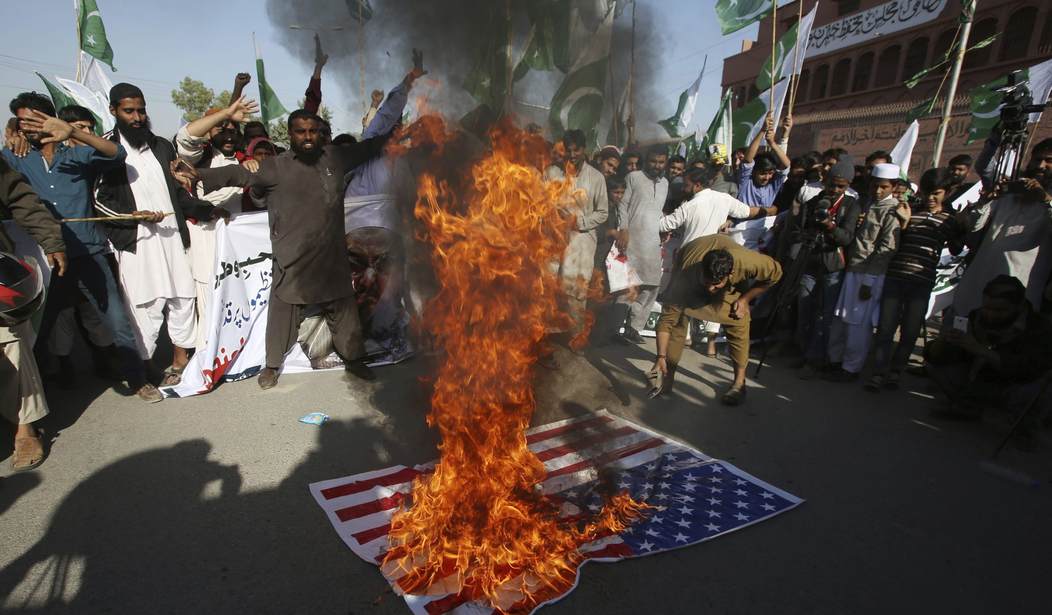The purveyors of “moderate Islam” increasingly come off as salesmen: after describing their “customer’s” problem with great accuracy, they present their “product” as the solution—without much by way of explanation.
Take a recent article titled, “How to Make the Islamic World Less Radical,” by Yahya Cholil Staquf, published by the Wall Street Journal on January 14, 2021. The first half of the article accurately summarizes the problem and is worth quoting at length:
Nearly a generation after 9/11, the world has made little progress in freeing itself from the threat of radical Islam. For every Osama bin Laden or Abu Bakr al-Baghdadi the U.S. eliminates, 100 radicals pop up.
Horrendous violence has engulfed much of the Islamic world, from the Central Asia through the Middle East to Africa. It also erupts periodically on the streets of London, Paris and New York. As of 2019, Britain’s domestic intelligence agency alone maintained watch lists comprising over 35,000 Islamist terror suspects believed to pose a threat to the U.K.
Why is the modern world plagued by Islamic extremism? Why do al Qaeda, Boko Haram and Islamic State display such savagery?
As I told the United Nations General Assembly recently, the doctrine, goals and strategy of these extremists can be traced to specific tenets of Islam as historically practiced. Portions of classical Islamic law mandate Islamic supremacy, encourage enmity toward non-Muslims, and require the establishment of a universal Islamic state, or caliphate. ISIS is not an aberration from history. […]
Classical Islamic orthodoxy stipulates death as the punishment for apostasy and makes the rights of non-Muslims contingent on Muslim sovereign’s will, offering few protections to nonbelievers outside this highly discriminatory framework. Millions of devout Muslims, including many in non-Muslim nations, regard the full implementation of these tenets as central to their faith.
So far so good; but then, having accurately described the scope of the problem, Staquf suddenly (and subtly) goes into reverse:
The problem is that these tenets, which form the core of Islamist ideology, are inimical to peaceful coexistence in a globalized, pluralistic world. But we can’t bomb an ideology out of existence. Nearly 1 in 4 people in the world is Muslim, and many Muslims—me included—are prepared to die for our faith. The world isn’t going to banish Islam, but it can and must banish the scourge of Islamic extremism. This will require Muslims and non-Muslims to work together, drawing on peaceful aspects of Islamic teaching to encourage respect for religious pluralism and the fundamental dignity of every human being.
So, after correctly asserting that the authentic doctrines of Islam “mandate Islamic supremacy,” “encourage enmity toward non-Muslims,” and that “ISIS is not an aberration from history,” Staquf suddenly minimizes the issue by labeling it “Islamist ideology” and “Islamic extremism”—as if to say none of what he’s talking about is innate to Islam. He even goes so far as to present himself as willing to be “martyred” for the apparently “real Islam,” which, of course, is open to holding hands and “working together” with non-Muslims.
Moreover, note how he limits the non-Muslim world’s options. Strictly speaking, not being able to “bomb an ideology out of existence” is not true. More importantly, who said such an extreme measure was necessary? Merely speaking the truth; holding Islam accountable; enforcing sanctions and withholding aid; and simply banning Islam and its practitioners from non-Muslim nations—all measures that would not “bomb” or kill any Muslims—would go a long way in eliminating “Islamic extremism,” and by Muslims themselves (as almost occurred during the colonial era).
At any rate, having won the critical reader’s trust by his initial presentation of the problem, and having brushed aside any actual solutions, Staquf proceeds to offer his solution:
The most enduring way to address an extremist religious ideology is to recontextualize its teachings and reform it from within. … What’s needed is a credible alternative that is consistent with Islamic orthodoxy and developed and promulgated by those with religious and political authority in the Muslim world.
This all sounds well and good, but if “Islamic orthodoxy” is itself the problem, as Staquf himself initially and correctly asserted, how can any “alternative”—meaning something that contradicts orthodoxy—ever be “credible”? If the Koran and prophet clearly and unequivocally call for the punishment and death of apostates and animosity for and discriminatory subjugation of non-Muslims—and they do—how can calling for the opposite ever be deemed “credible” by sincere Muslims?
Apparently these all-important questions do not matter; what matters is the sales pitch of Staquf’s product, which finally appears toward the end:
Indonesia’s Nahdlatul Ulama, the world’s largest independent Muslim organization, for which I serve as general secretary, is promoting such an alternative…. Leaders throughout the world can best contribute by examining the understanding of Islam that flourishes in Indonesia.
No doubt world “leaders” and everyone else who reads Staquf’s op-ed can “contribute” in other ways to Indonesia’s Nahdlatul Ulama—to the “product” that will make their problem (“radical Islam”) go away—as well-pitched by its general secretary’s op-ed.
Incidentally, one need not underrate or denounce the efforts of Muslim reformers as futile or insincere to embrace a simple fact: whenever such reformers direct their appeals or efforts at us—non-Muslims, “infidels,” who by definition have zero influence on Islamic dogma—as opposed to their own coreligionists, where both the problem and solution lay, they have another agenda.










Join the conversation as a VIP Member